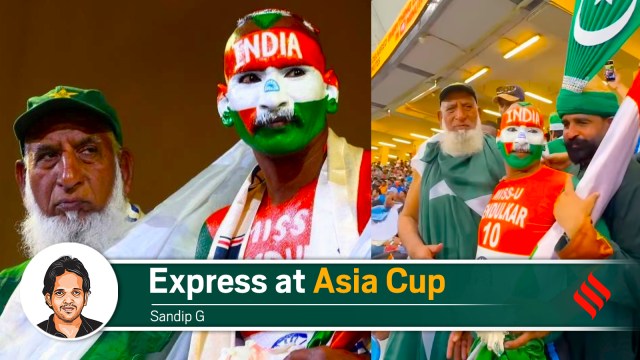Generals of Peace: In the Cauldron of an India-Pakistan Final, Two Superfans Lead with Hugs, Not Hate

Image via The Indian Express
DUBAI – The desert air in Dubai is electric, humming with an energy that can only mean one thing. It’s the day of the grand finale, the summit clash of the Asia Cup. And it is the one fixture that turns a cricket match into a global event: India versus Pakistan. Tonight, the iconic ‘Ring of Fire’ stadium will be a seething cauldron of emotion, a vibrant mosaic of blue and green, as two nations, bound by a shared history and divided by a bitter rivalry, watch their heroes battle for supremacy.
The pressure will be immense, the stakes astronomical. Fortunes will be made and lost on a single delivery; heroes and villains will be anointed in a matter of hours. This is the pinnacle of cricketing rivalry, where sport and geopolitics collide. Yet, amidst this maelstrom of high-stakes competition, a story of profound peace and unwavering friendship will provide the match its true soul. It is the story of two men, generals of their own passionate armies, who will wage a war of support for their teams but will end the night in a brotherly embrace. They are India’s Sudhir Kumar Chaudhary and Pakistan’s ‘Chacha Chicago’, Chaudhry Abdul Jalil.
The Living Canvases of National Pride
To see them is to understand them. Sudhir, a man from a small town in Bihar, has transformed his own body into a living temple of Indian cricket. Hours before every match, he undertakes a sacred ritual, meticulously painting his torso in the saffron, white, and green of the Tiranga. A map of India is etched onto his shaven head, a permanent tribute. For years, his idol Sachin Tendulkar’s name was his centerpiece; now, it is simply “INDIA.” His journey is the stuff of legend—leaving his job, cycling thousands of kilometers just to be present for a match, and eventually being embraced by the very players he worshipped. When he blows his conch shell, its sound echoing across the stadium, it is not just a noise; it is an invocation, a prayer for his team.
Across the aisle stands his spiritual counterpart, Chacha Chicago. Originally from Sialkot, the city that produced so many of Pakistan’s cricket legends, he has spent decades in the United States. But his heart has never left the cricket field. Clad in his immaculate green and white shalwar kameez, a star and crescent on his cap, he is a figure of patriarchal pride and boundless joy. He has spent his own fortune and countless hours traveling from his American home to grounds all over the world. When he raises his arms and lets out his trademark roar of “Pakistan Zindabad!”, he is not just a fan; he is a beacon for the Pakistani diaspora, a vibrant connection to the motherland.
The Unbreakable Bond
For the 100 overs of the final, they will be fierce opponents. Sudhir will lead the chants of “Jeetega bhai jeetega, India jeetega!” Chacha will counter with his own chorus. They will live every ball, their expressions mirroring the fluctuating fortunes of their teams. But this on-field rivalry is just one chapter of their story. The more profound chapter is written off the field, in the quiet moments before the storm.
“He is my brother. Cricket has given me many things, but this friendship is a special gift from God,” Chacha says, his voice filled with warmth as he speaks of Sudhir. “We met many years ago. I saw his passion. It is the same as mine. Our languages are a little different, our flags are different, but the language of our hearts is the same: cricket. We will have tea together before the match begins. He will tell me India is winning; I will tell him Pakistan is. We will laugh.”
Sudhir, though a man of fewer words, shares the sentiment deeply. “In the stadium, we have a job to do for our team. We cannot be soft. But outside? Chacha is family. He is older than me; I give him the respect of an elder brother. We have seen so many matches together. We have seen each other happy, and we have seen each other sad. The result of the match changes, but our respect for each other never will.”
Their promise is simple and profound. “Tonight, after the last ball is bowled, after one captain has lifted the trophy and the other is consoling his team, we will find each other,” Chacha declares. “There will be a hug. If his team wins, I will congratulate him from my heart. If my team wins, he will do the same. This is our tradition. It is more important than any victory.”
A Message for a Divided World
This tradition stands in stark, beautiful contrast to the often-toxic atmosphere that surrounds this fixture online. In a digital age where anonymous trolls spew vitriol and every match is treated as a proxy war, the visual of Sudhir and Chacha’s camaraderie is a powerful antidote. They are ambassadors of an older, more graceful form of fandom, proving that one can be a fervent nationalist without being a hateful rival.
So, as the world tunes in tonight to watch the gladiatorial contest on the field, the real spirit of the game will be embodied by these two men in the stands. They remind us that for all the political baggage and historical animosity, cricket can still be a bridge. While one team will be crowned the champions of Asia, the lasting image of this final may well be the embrace of two friends. And on that scorecard, humanity, respect, and the love for the game will be the undisputed winners.